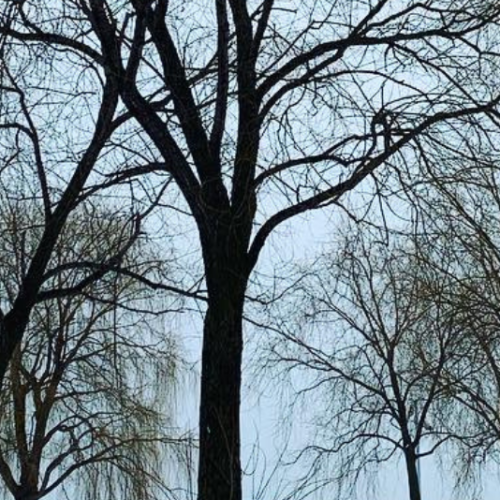I felt safe going back to his apartment after our first date because I’d met him at the library. In front of the Hot Summer Reads! display, he’d been beanstalk-tall in an R.E.M. t-shirt. Jeans cuffed around his ankles and a Kundera novel in an oversized hand. Later, at the bar, he wrapped his fingers around my wrist, and my pulse twitched like a minnow in the shallows. So I went home with him.
Now, as we sit on his couch, our cheeks wine-pink, I take in his bookshelves and concert posters. Radiohead in Montreal, The Flaming Lips in L.A. My almost-real laugh, the one I use to make men comfortable, floats around the room. A breeze from the window fusses with my hair. It’s all going fine, normal stuff, until I notice the specialty knife on the side table. The expensive kind: serrated edge, full tang, tip curved toward the ceiling like a question mark. He notices me eyeing it, and I wonder if he left it out on purpose.
“Do you want to?” he asks. Not everyone would on the first date, but I nod, wiping my palms on my sundress. I’ve never considered myself prudish. I walk toward him over floorboards yellow as honey. The white flowers on my dress flutter around my thighs.
In the kitchen, he soaps his hands thoroughly and above the wrist, like a doctor. I lean back over the counter. I’ve only done this once, but that man was handsome and steady-handed. Quick, with a mouth full of white teeth.
“Have you done this before?” I ask.
“Yes,” he says, but it sounds like no.
It’s just one, I remind myself. I won’t miss it. I can’t miss a memory I no longer have. Still, you always hope they pick one you want gone. Some small sadness or embarrassment—when you gave a wrong answer in class or lost something a friend lent you. Not one of your family at the diner, crammed into a sticky booth at sunset, the last time you all laughed together. Not one of the first boy you really liked, his hand trembling along the curve of your knee.
Anyway, it’s worth it. When a memory is plucked out of you, there’s only one seasick second before the pleasure swells. Release, smooth and bright. When you let part of yourself go, it feels like your skull will split with freedom.
I hear a rhythmic rustling behind my head and think he’s fidgeting when he should be getting on with it. Then I realize it’s the sound of my own blood rushing through the valves of my heart. Like fingers rubbing fabric between them: back and forth, back and forth. I’m not nervous, but my heart must be. Calm down, I say to my body. I’m impatient with the both of us, me and him.
He leans over and gets going. When his knife nicks the edge of one, I see it for the last time: I’m a child at the beach, digging for tiny burrowing mussels colored blue, purple, pink. Hot sun overhead, the wind salty and coarse. I wait for a wave to come and sink my fingers into the sand.
He tugs it out, and I can’t help the small moan that escapes me. I’m unraveled, sliced with light. When he finishes, there’s a lot of blood, but that’s normal. It always looks worse than it is. They exaggerate the danger when they warn kids away from this in health classes and public service announcements. You can’t lose a year of memories from a single botched pull. You have to let go one by one, and I’m not one of those girls who gives and gives until there’s nothing left.
“Let’s do one more, yeah?” He’s rooting around with the knife tip as if he were weeding a garden.
“Maybe later,” I say.
When I sit up, the memory is puddled on the counter, a bloody ribbon with pulpy edges. I already can’t remember it. When I push the gob into the trash, it leaves a bright red smear. He hands me a folded towel for my head and a beer, and we do the normal stuff, then, skin on skin in the dark. It’s good, but I can’t stop thinking about being unspooled into air.
When I leave at dawn, my scalp aches, but no worse than a hangover. My mom used to say I had a tender head because I’d wail when she brushed my hair. “But no need to be dramatic,” she’d say. I buy a croissant and head toward the subway, where a groan rises out of the earth.

K.S. Dyal
K.S. Dyal is the author of the novella It Felt Like Everything(Ad Hoc Fiction 2022) and works in or coming from Colorado Review, BOOTH, HAD, SmokeLong Quarterly, Pithead Chapel, and elsewhere.



